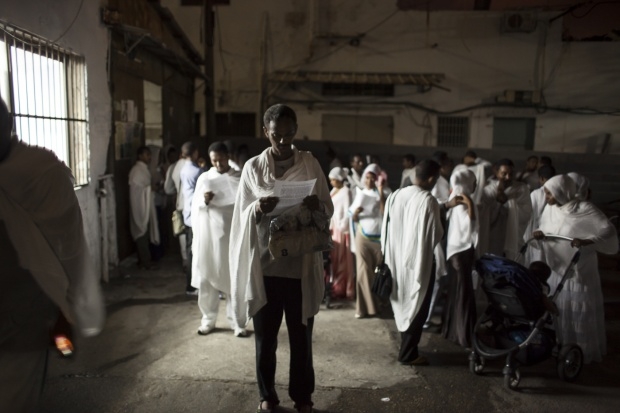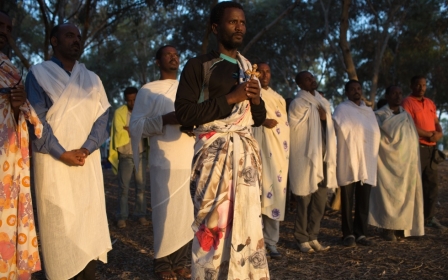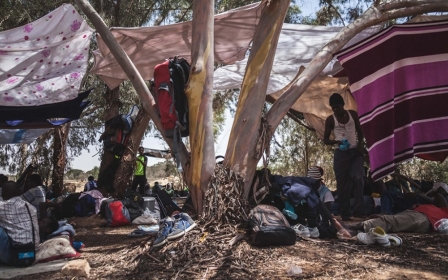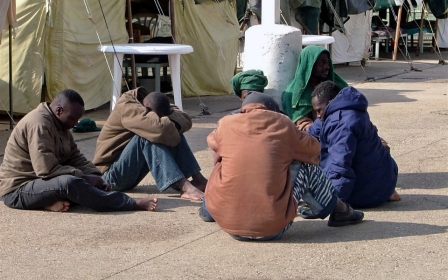Analysis: The closing of Holot signals Israeli court battles to come

This week the Israeli Supreme Court struck down several controversial amendments to the Infiltration Law, which allowed authorities to imprison asylum seekers for up to one year without trial. The ruling, pronounced by a majority of seven justices in a panel of nine on Monday, also ordered all 2,200 asylum seekers confined to the detention facility at Holot to be released within 90 days, and eased their custodial regime with immediate effect. The judgement stressed that the Law of Entry into Israel, which allows detention for up to 60 days, is sufficient for dealing with unauthorised border crossings.
Writing on Israeli website +972 Magazine a few hours after the ruling, Mutassim Ali, one of the key organisers of the refugee community in Israel and himself a detainee in Holot, celebrated the decision but warned against excessive optimism. “To my community, don’t get too excited,” he wrote. “Interior Minister Gideon Sa’ar is going to look for ‘Plan C,’ which will not be good for us. But keep hopeful and optimistic and, as I said very long ago, justice will always stand firm.”
The ruling represents a significant and extremely rare victory for the asylum seekers and civil society activists, who experienced in recent years defeat after defeat in their struggle to formally secure refugee status, or at least some minimal civil rights, for the tens of thousands of African asylum seekers who have entered Israel over the past decade.
Although Israel was one of the earliest ascenders to the 1951 Refugee Convention and the 1967 Protocol, it has been extremely selective as to the application of the two treaties. This approach was launched in 1954, with the original Infiltration Law - ostensibly designed to criminalise attacks by Palestinian guerilla slipping back across the border, but effectively proscribing the return of any Palestinian refugees. When the first large groups of African refugees - largely from Sudan, Eritrea and the Ivory Coast - began arriving in Israel in 2006, the state granted them group protection against involuntary deportation in a move that violated Israel’s obligations under the above treaties. It dragged its feet in offering the asylum seekers official refugee status with the basic rights that it confers; Israel accepted only 0.2 percent of asylum requests, as compared to the EU average of 25 percent and the US average of 51 percent.
Among the many rights lacking from the group protection was the right to work - an economic barrier that effectively confined the asylum seekers to the poorest neighbourhoods of Tel Aviv, where local residents, themselves on the receiving side of decades of racially motivated discrimination, saw the asylum seekers as dangerous invaders, stealing local job opportunities and taking over the street. This resentment was fanned and cultivated by right-wing politicians, who perceived the popular grudges and increasingly racist attitudes among the residents as a source for easily scoring electoral points. Their joint efforts reached a fever pitch in 2012, culminating in riots against Tel Aviv’s African population and in an amendment of the Infiltration Law, broadening it to refugees illegally entering Israel in general and allowing their detention for up to three years without trial.
This amendment was struck down unanimously by a panel of nine justices in September 2013 - who allowed, however, for the state to make new and less radical amendments to the law. This second amendment was shot down - not unanimously but much more unequivocally.
As Ali wrote, this week's victory might be very short lived. But for Israeli civil society, it might also prove to be Pyrrhic. Monday’s ruling represents the first time in Israeli history that the court has struck down the same legislation twice, stoking the fires of a brewing clash around the role of the Supreme Court vis-a-vis the legislative authority. According to Israeli constitutional law, the Supreme Court can cancel legislation which contravenes Basic Laws which are special status laws that serve as replacements for a comprehensive constitution in Israel. This has long been a source of contention for the Israeli Right, which never tires of protesting the mandate of democratically elected representatives being restricted and, at times, overruled by a panel of unelected justices overwhelmingly associated with Israel’s old central-Left secular upper class.
Over the past few years, centre-right and right-wing coalitions alike tried to hamstring the Supreme Court, whether by subtly altering the balance of power in the Judicial Appointments Committee, restricting the Court’s authority over security and defence issues (despite the Court traditionally favouring the state in these matters), or diminishing the Court’s role as part of a comprehensive, centralising government reform.
Unsurprisingly, the Court’s repeated striking down of the same legislation prompted fresh promises of judicial reform. The charge this time by Interior Minister Gideon Sa’ar, who, despite his recently announced plans to take an indefinite leave from politics, remains the formidable political leader and a top candidate to succeed the increasingly weakened Netanyahu.
Sa'ar, momentarily forgetting both his promise to retire and his much amplified rift with Prime Minister Benjamin Netanyahu, announced immediately after the ruling that he “spoke to the prime minister” about the need to reform the Basic Law: Human Liberty and Dignity to constrain the Court’s mandate (without specifying how, exactly). He was quickly joined by much of the leadership of the coalition, including many who made their political capital on populist incitement against refugees and asylum seekers. Sa'ar’s withdrawal remains on the agenda and the challenge of such cardinal reform is probably way above Netanyahu’s crumbling sway. But both the popular mood and the increasing political consensus among the dominant parties on the right of centre-right are supportive of such reform - not only making it only a matter of time, but instigating a “chill effect” that is already cowing the court into gingerly picking its battles. This might be the last bold ruling of this magnitude for a while.
Constitutional matters aside, however, the closing of Holot is a far cry from resolving the issue of asylum seekers in Israel. As organisers among this community itself are demanding, the first priority must be the creation of a transparent and credible process for consideration of asylum requests. The right to work must be awarded even to those asylum seekers whose status is still being weighed by the authorities, both for their own sake and to alleviate the pressure on infrastructure and services in Israel’s poorest areas. And the social and economic needs of these areas, as well as their as yet unconfronted historical resentments, must be addressed on their own terms, as a matter of urgency - both because the “original” residents deserve rights, welfare and justice and also to assertively effuse their unfortunate, involuntary function as hotbeds for ethnic and social tensions in an already divided state.
New MEE newsletter: Jerusalem Dispatch
Sign up to get the latest insights and analysis on Israel-Palestine, alongside Turkey Unpacked and other MEE newsletters
Middle East Eye delivers independent and unrivalled coverage and analysis of the Middle East, North Africa and beyond. To learn more about republishing this content and the associated fees, please fill out this form. More about MEE can be found here.




